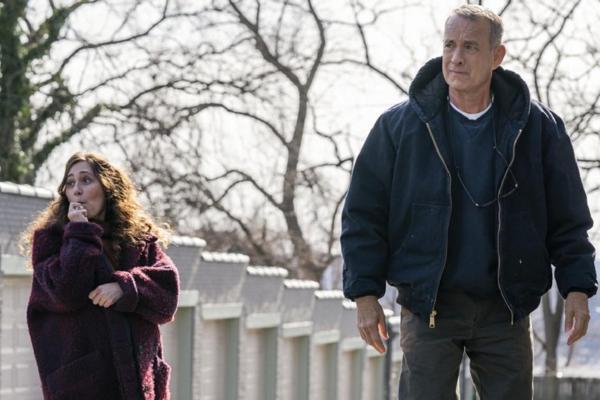A grumpy Tom Hanks stars in ‘A Man Called Otto’
NEW YORK


Sentimental tales about grumpy old men and American decline have, until recently, typically been the domain of Clint Eastwood.
But in “A Man Called Otto,” Marc Forster’s adaptation of Fredrik Backman’s bestseller and a remake of the 2016 Swedish film “A Man Called Ove,” it’s Tom Hanks prowling the neighborhood and irritably grumbling about how things used to be.
In the original, Rolf Lassgård richly inhabited the role of Ove, a curmudgeonly widower ,a Forrest Grump,whose suicide attempts are foiled by needy neighbors and, ultimately, his grudging, sincere devotion to them.
Exasperation, whether directed at a crying ballplayer or a slobbering canine, has always been squarely in Hanks’ wheelhouse. But despondency or even plain get-off-my-lawn orneriness are less obvious traits possessed by the actor sometimes called “America’s Dad.”
Following Hanks’ villainous turn as Col. Tom Parker in “Elvis,” the 66-year-old has found in “A Man Called Otto” another role that interestingly, if not always entirely successfully, caters to his strengths while tweaking his familiar screen presence.
It also may rob “A Man Called Otto,” which opens with Otto buying rope to hang himself with, of some of its spirit. We know there are dark roads that Hanks just isn’t going to go down, and some of the early, more caustic scenes of Forster’s film strike a false note. But as “A Man Called Otto” makes its way through Otto’s life, cutting between his present-day squabbles and flashbacks of happier times with his wife, Sonya (Rachel Keller), Hanks movingly tailors the role to himself. How “A Man Called Otto” unfolds won’t surprise anyone, but it does the trick for a little post-holidays heart-warming.
“A Man Called Otto” is set in the prefab row-house development Otto has long lived in, where he tirelessly tisk-tisks any rule breakers, re-sorts misplaced recycling and berates drivers who violate the street’s regulation against through traffic.
Screenwriter David Magee (‘Life of Pi,’ ‘Finding Neverland’) hues closely to the Swedish film as a kind of parable of community. Up and down the street are all the people the freshly retired Otto barely tolerates: Friends-turned-enemies (Peter Lawson Jones, Juanita Jennings), a friendly exerciser (a delightful Cameron Britton), a transgender paper deliverer and former student of Otto’s wife (Mack Bayda). Most of all there is Marisol (a terrific Mariana Treviño), a pregnant mother of two has just moved in with her husband (Manuel Garcia-Rulfo).
Various needs - a stray cat, a borrowed ladder, driving lessons - intrude on Otto’s desires for a peaceful death and, in between aborted suicide attempts, gradually rekindle his will to live.
It’s sometimes too broadly drawn. Mike Birbiglia plays a predatory real estate agent from a company not-so-subtly called Dye & Merica. (‘Sounds like Dying America, which it is,’ says Otto.) But “A Man Called Otto” is less after realism than it is a modern-day fable, with shades of Scrooge and the Grinch. As a tale of a solitary man, Hanks has made it a poignant work of family.
Rita Wilson, his wife, is a producer and is heard singing a song in the film. The younger Otto is played in flashbacks by their son, Truman Hanks. Even Chet Hanks’ “White Boy Summer” blares from a car radio.
Another tune, though, is a more thrilling needle drop. The less said probably the better, but suffice to say, it could be a sign that the Kate Bush renaissance so hearteningly kicked up by “Stranger Things” has not yet abated. If that’s not life-affirming, I don’t know what is.
